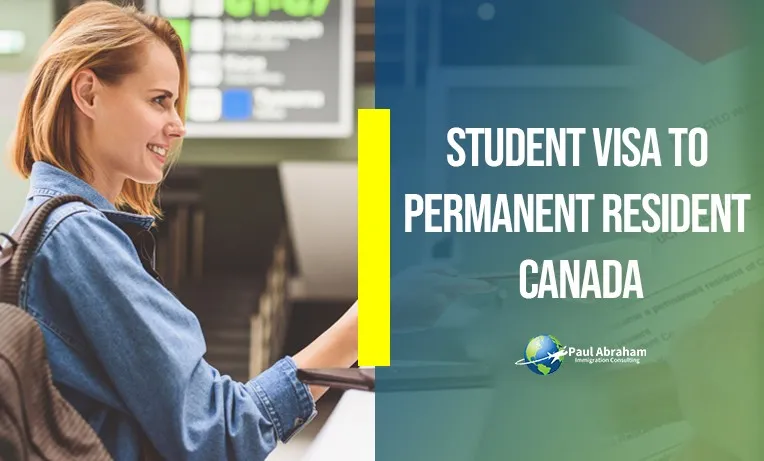Student Visa To Permanent Resident Canada

Last Updated On : April 25 , 2022
Study in Canada to get PR
International students enrolled in Canada can apply for permanent residence status in Canada while they are studying or after they have completed their studies, as long as they match the necessities of the Canadian immigration plan they are applying for. The procedure of applying for a Canada study visa and Canadian Permanent residence status simultaneously is known as “dual-purpose,” and it is frequent and legal in Canada.
There are several low-cost study options. Many reasonably priced study programs are offered at Canadian universities and colleges for interested students to complete their education and get permanent residency in Canada after completing a one-year term. We’ll talk about how to gain permanent residence in Canada after completing a one-year course starting ahead.
How to get PR in Canada after the study?
After finishing a one-year study program, one of the best methods to obtain permanent residency is to apply for a Post Graduate Work Permit. This would enable you to get significant Canadian job experience, but it will also help you enhance your CRS score for Express Entry.
Suppose you have a Canadian education and job experience. In that case, you can apply for the Canadian Experience Class, which is one of the economic immigration streams that helps international students having work experience move to permanent residence in Canada.
You will obtain an international student permanent residence invitation in one of the countries listed below if your Express Entry candidate profile is reinforced by work experience earned in Canada and a high-quality educational background.
Best Province to Study to Get PR Easily
Ontario – This Canadian province is an important centre for the information and technology industries. Immigration seekers who want to work in Artificial Intelligence, IoT, Machine Learning, and current technology can get firm job offers and develop a long-term career. Ontario actively seeks candidates with an IT background.
Nova Scotia – is home to several financially sound and viable finance organizations, firms, and agencies. Employees can create a promising future for them and secure their children’s lives. Furthermore, it is an excellent location for medical professionals and has a high demand for nurses. Aspirants from the finance industry should choose Nova Scotia as their province of residence to obtain permanent residency in 2022.
How to Get PR in Canada after 2 Year Study?
To obtain permanent residency in Canada after completing a two-year diploma program, you must work in your subject of practice for at least one year after obtaining two Post Graduate Work permits.
Please keep in mind, however, that you must meet specific criteria before you can apply for permanent resident status in Canada as that an international college grad:
- As an international student, you must ensure that you have spent sufficient time in Canada.
- You need to choose your institution carefully while choosing an institution to apply for PGWP after completing your education.
- Your institution or school must be a DLI (Designated Learning Institution), making overseas students eligible for a study permit in Canada.
If you want to ensure, you have to perfectly apt these rules for PR in Canada for International students.
Is there any 1-year course in Canada for PR?
Diploma in Business Admin, Diploma in Hospitality Industry, Diploma in Accounting, Diploma in Marketing, Diploma in Marketing and Graphic Design, Diploma in Bakery and Pastry Arts Management, Diploma in Internet Security Specialist, Diploma in Data Analytics Co-op, and other 1-year diploma courses are available in Canada.
Study pathways to permanent residence
Students who complete particular degree programs have the opportunity to work at top companies in Canada. Here are some of the most significant long-term and short-term PR courses in Canada that will help students gain lucrative careers and opportunities:
- MBA
- MSc in Computer Science/IT, Data Science, Big Data, Finance, Banking
- MTech in Civil Engineering, Mechanical Engineering. Electrical-Electronics, Chemical Engineering, Engineering
- Management MD
How to Get Pr in Canada without Study?
A degree is not required to apply for PR, but it may be required for some occupations, and if you are filing based on your experience in a specific industry, you may be required to demonstrate your qualifications for that job.
For example, you must have a teaching degree; it makes no difference whether you have been a school teacher for fifteen years in some other country without the need for a degree. If you have extensive experience in a profession or job which does not require a college degree and is challenging to fill in Canada, you may be able to obtain a job offer and WP.
So, if you need more information, you may speak with one of our immigration professionals to receive specialized advice tailored to your needs.
Conclusion:
Our RCIC, Mr. Paul Abraham, has been a player in this particular aspect. Thus, he is the best person to guide you through the entire process. The PAIC team takes care of your immigration application from scratch till the end. Please visit our website for better guidance.
